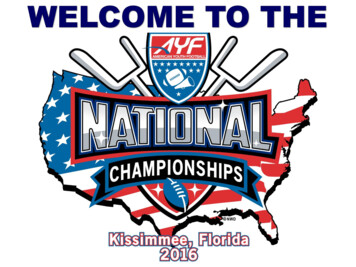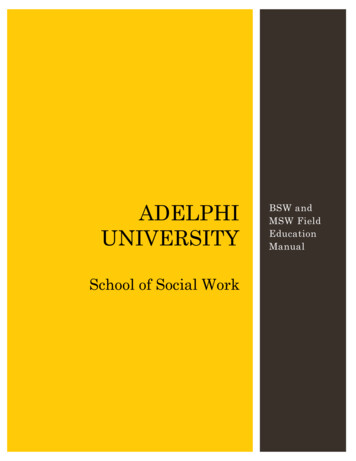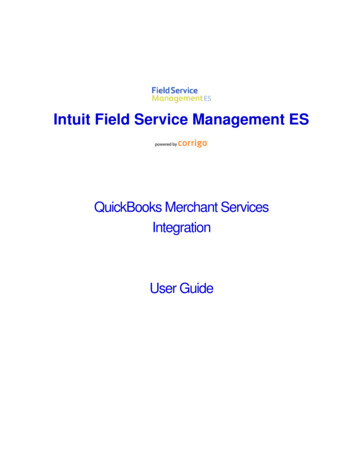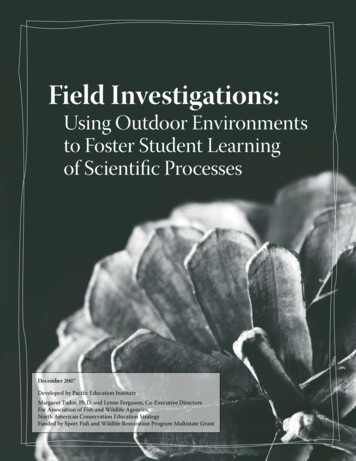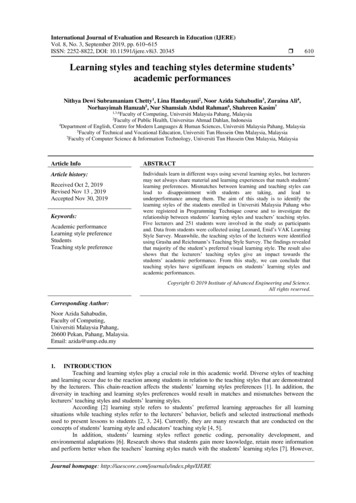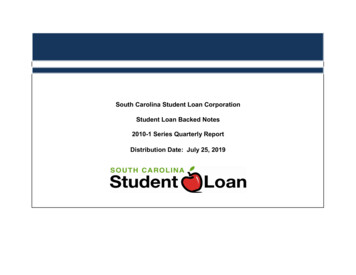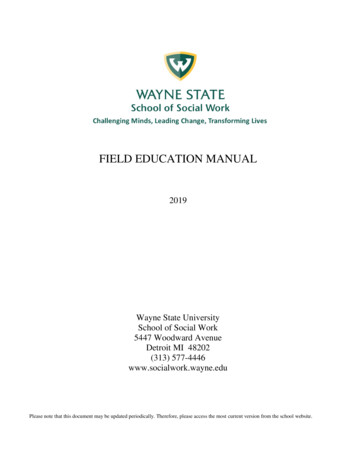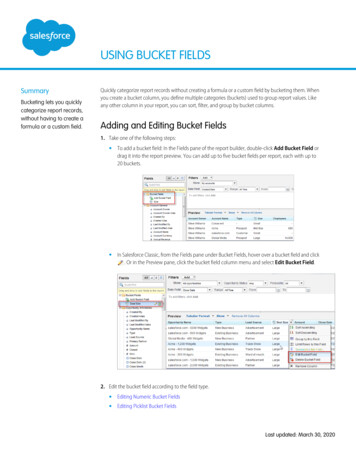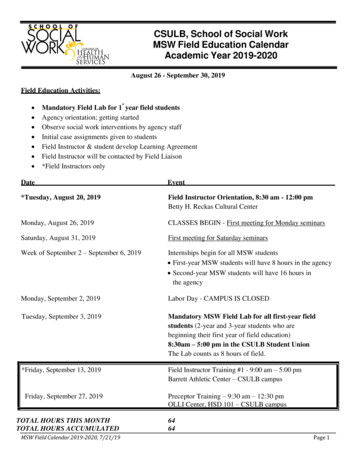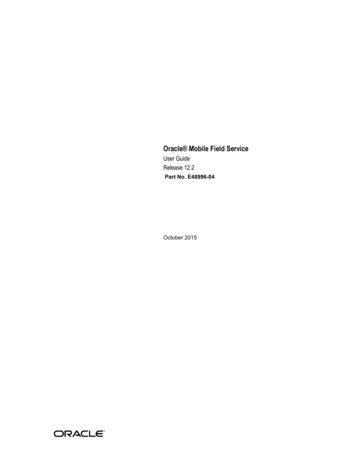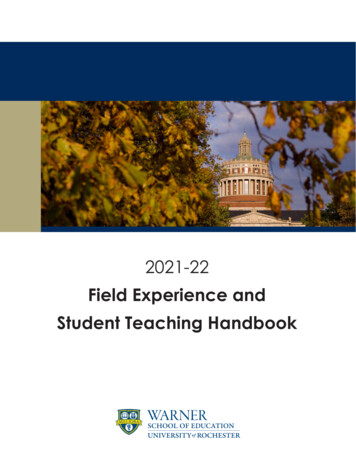
Transcription
2021-22Field Experience andStudent Teaching Handbook
Field Experience and Student Teaching HandbookDear teaching candidates and teacher educators:Welcome to the Warner School of Education and Human Development’s field andstudent teaching experiences! This is an exciting time for candidates as they embark on theclinical phase of their education, working to deeply understand the joys, challenges, andopportunities of teaching.While candidates are most in control of their individual journeys as beginning teachers,the process of learning to teach inevitably is embedded in social institutions with differentkinds of people, resources, values, and norms. Several recent studies point to the importance ofstable school contexts and collaborative networks of mentors and supervisors for strengtheningnew teachers’ practices. We know, for example, that when mentors model and explainpowerful teaching and provide candidates with regular constructive feedback in safe learningenvironments, those candidates go on to be more effective first-year teachers. In other words,the success of our students’ clinical experiences depends on the dedication and collectiveefforts of various people committed to helping them become creative thinkers, capablepractitioners, and future leaders in their field.This handbook was developed to serve as an initial resource supporting all involved inthe clinical phase of teacher education, including candidates, supervisors, and cooperatingteachers. At the Warner Graduate School of Education and Human Development, our ultimategoal is to prepare educators who are committed to the highest standards of teaching, learning,and public service – teachers who, in time, can transform the lives of their students and theschools in which they teach. We thank you sincerely for committing your time and energy tothe process of engaging in this important work together.Sincerely,Jeffrey Choppin and Kevin MeuwissenCo-Chairs, Teaching and Curriculum
Field Experience and Student Teaching HandbookContentsHandbook Purpose . 2The Warner School Mission And Vision . 4Teaching And Curriculum Program Philosophy. 5Warner School Principles And Targeted Proficiencies For Teacher Candidates . 81. Content Principle . 82. Learning Principle . 93. Equity Principle . 94. Pedagogy Principle . 95. Learning Community Principle. 106. Communication Principle . 107. Planning Principle . 118. Assessment Principle . 119. Professional Practice Principle . 1110. Community Principle . 12Roles And Responsibilities Of The Candidate . 13Roles And Responsibilities Of The Cooperating Teacher . 15Roles And Responsibilities Of The University Supervisor . 18Roles And Responsibilities Of Warner Faculty . 20Roles And Responsibilities Of The Director Of Student Teaching . 22Professional Conduct . 23Frequently Asked Questions . 26Letter of Expectations . 28Letter of Expectations: Specific Requirements. 28Absence Report . 32Legal Aspects Of Student Teaching . 33Physical Restraint Of Students. 382021-2022 Program Faculty and Supervisor Directory . 39
Field Experience and Student Teaching HandbookHandbook PurposeHandbook PurposeThis handbook provides flexible guidelines through which the cooperating teacher,university supervisor, teaching candidate, and university professor can combine theirdispositions, knowledge, and skills to develop a clinical experience that is rewarding to all.By clarifying expectations at the outset and evaluating the process of learning to teach overtime, our program ensures that:Candidates systematically improve their teaching knowledge and practices from fieldexperience through student teaching by gradually increasing their responsibility andindependence in a supportive environment.Cooperating teachers benefit from the energy and ideas of the candidate, allowing forinnovative instructional approaches within the boundaries of the curriculum and schoolprocedures.University supervisors and Warner School faculty strengthen their knowledge andpractice in teacher preparation by maintaining open and collaborative relationships with thecandidate and the cooperating teacher and by drawing directly from candidates’ clinicalexperiences in their coursework.This handbook outlines what we believe to be a unique approach to mentoring andsupervising candidates. Before the beginning of the field and/or student teaching experience,candidates and cooperating teachers should familiarize themselves with the handbook.Cooperating teachers should focus especially on:1. The overview of the program2. The roles and responsibilities of the cooperating teacher3. Information regarding the letter of expectationsCandidates should focus especially on:1. The overview of the program2. The roles and responsibilities of the candidate3. Information regarding the letter of expectationsThe goal of the program is to develop reflective teachers through a flexible structureinvolving:1. Clear expectations.2. Regular observations by and feedback from both the cooperating teacher and theuniversity supervisor.3. Regular meetings to review the progress of the candidate and the process as a whole.2
Field Experience and Student Teaching HandbookHandbook PurposeWhile the candidates are completing their field experiences and student teaching, they are alsotaking concurrent, complementary university courses. Some of these courses are taken by allcandidates across all programs (e.g., Race, Class, Gender, and Disability in American Education;Literacy Learning as Social Practice); others are taken only by candidates in their unique subjectareas (e.g., methods courses and student teaching seminars). The purposes of these courses are todevelop candidates’ theoretical and practical knowledge of learners and learning, teaching, andschool and community contexts; to help candidates link their disciplinary knowledge to theirevolving pedagogical dispositions and practices; to provide candidates with opportunities toreflect and build new ideas and strategies upon their clinical experiences; and to interact withnumerous teacher educators simultaneously as they learn to understand and take on newprofessional responsibilities.3
Field Experience and Student Teaching HandbookHandbook PurposeThe Warner School Mission And VisionAt the Warner School of Education and Human Development, we believe thateducation can transform lives and make the world more just and humane. This visioninforms our teaching, research, and service as a graduate-level professional school ina research institution, as we strive to: Prepare knowledgeable, reflective, skilled and caring educators who can make animpact in the lives of individuals and who are leaders and agents of change; Generate and disseminate knowledge to lead to new understandings of development,learning and change, on which more effective educational policies and practices canbe grounded; Collaborate across disciplines, professions and constituencies – to promote changethat can significantly improve and transform education and support positive humandevelopment.Our work in each of these domains is informed by the underlying beliefs that: theimprovement of education is in pursuit of social justice; development and learning shapeand are shaped by the socio-historical contexts in which they occur; the complexity ofeducational problems requires an interdisciplinary and collaborative approach; and bestpractices are grounded in research and theory, just as theory and research are informed bypractice.4
Field Experience and Student Teaching HandbookHandbook PurposeTeaching And Curriculum Program PhilosophyOur philosophy of education at the Warner School applies to teacher educationprogramming in the following ways:Integration of content and pedagogy.Effective teachers need to have a solid understanding of the subject matters they teach. Theyneed to confront fundamental questions of what they should teach, how it should be taught,why it should be taught that way, and what fundamental social good it serves. In addition,future teachers need to know what is appropriate for the age/grade level they teach and forthe children, families, and communities in which they teach. Therefore, “teaching methods”are not developed universally, or in isolation, but are grounded in theory, research, andpractice that helps candidates understand particular relationships among students, teachers,subject matters, and the contexts in which they interact and learn. At the core of eachteacher preparation program are two or more courses that attend to the nature of the subjectmatter to be taught, aims and practices for teaching it, and the assumptions and implicationsof choosing specific teaching methods in particular circumstances at various developmentallevels.Integration of theory and practice.At the Warner School, we believe that research and practice are deeply and inseparablyintertwined; and we believe that future teachers should be able to use knowledge gainedthrough a synthesis of research and practice to construct environments where qualityteaching and learning can take place. Warner candidates have a unique opportunity tounderstand these intersections throughout their course of study, given the concurrence ofclinical experiences and coursework. While challenging for both students and faculty, thisapproach encourages candidates to bring insight and questions from their classroomexperiences into their courses and vice versa, and to develop the habits of a reflectivepractitioner. Further, given their roles in a research school of education, Warner Schoolfaculty believe strongly in the notion of praxis: that educational change is built from mutualinteractions among research, teaching, and public service. Warner School faculty conductoriginal research to build knowledge and improve practices in their fields, and in turn, wepress candidates to draw extensively and comprehensively from research results to makeprofessional decisions.A commitment to social justice.5
Field Experience and Student Teaching HandbookHandbook PurposeUnderlying all of our teacher preparation programs is a core commitment to ensuring that allyoung people have access to powerful opportunities to learn, grow, and participatemeaningfully and equitably in civil society. This commitment is situated in socio-historicalcontexts where particular groups are privileged and others are marginalized. Warner Schoolcandidates understand that social justice is both an ideology and a goal; that is, it is boththeoretical and practical. Teacher candidates come to see learning as a social practice thatinevitably requires them to engage with power structures and relationships to constructknowledge and meaning with their students. This requires more than good will and goodintentions; it requires a strong knowledge base and dispositions for making the world fairer,more equitable, and more humane through the subject matter they teach. We strive toencourage candidates to develop a sense of social responsibility by reflecting on themselvesand their interactions with others as raced, classed, gendered and abled individuals. Throughsuch reflection, our candidates develop important cross-cultural understandings and come torecognize teachers’ roles in maintaining or transforming practices that engender inequality.A commitment to inclusion of students with disabilities.We believe that all teachers should be prepared to recognize the diverse needs of theirstudents, and they should have strategies to differentiate instruction to meet those needs. Webelieve that all students bring rich and meaningful experiences to school, and that thoseexperiences should be drawn into the classroom as social resources for curriculum andinstruction. Warner School graduates lead efforts to advocate for the full inclusion of allstudents, particularly students with disabilities, as part of their efforts to improve schooling.We view inclusion as a commitment to the education of all students in heterogeneousschools and communities, and to maintaining high expectations based on students’individual strengths, needs, and interests. Inclusion promotes and requires collaborationamong school, family, and community while providing students and teachers with thenecessary supports and services. All of our programs include at least one course designed tohelp candidates facilitate the learning, participation, and belonging of students withdisabilities. We also make conscious efforts to offer pre-service teachers the opportunity toconduct their clinical experiences in fully inclusive settings.A sociocultural-historical perspective on learning and human development.We believe that young people learn through active engagement in culturally situatedactivities with knowledgeable others. Communities of learners and teachers emerge associal systems where knowledge is built, used, and negotiated through interpersonalrelationships; and thus, learning is socially constructed. It is not merely an act ofacquiring or receiving knowledge. We see children as agents who not only areaffected by cultural practices and institutions, but who also actively construct andchange the world. Course experiences and assignments model the construction of6
Field Experience and Student Teaching HandbookHandbook Purposecommunities of learners, and in turn, candidates come to understand how to buildmeaningful cultural contexts and communities for others to learn and develop.Using multiple forms of continuous assessment to inform instruction.Assessment is an integral part of meaningful teaching that supports learners’ development.We believe that powerful assessment generates clear evidence of student learning over time,is embedded in purposeful learning activities for real audiences, and is tailored to particularcontexts of learning, so as to support student inquiry, meaning-making, and expression.Warner School candidates come to see assessment as a way to strengthen curriculum andinstruction and better meet student needs, as well as to provide students with various waysto take measured risks and demonstrate growth. Student self-assessment and criticalreflection are integral to this model. Candidates will learn the importance of carefullycrafting multiple forms of continuous assessment with clear guidelines and feedbackopportunities for students, that also serve as decision-making tools for teachers. These formswill include formal and informal, summative, formative, and cumulative modes ofassessment. Candidates also will interrogate the climate and consequences of high-stakestesting and the limitations of using single-point assessment instruments to make decisionsabout students’ capabilities.A commitment to enhance student learning through technology.Technological tools are integral parts of interpersonal activity and learning in classrooms,communities, and society. In our courses, candidates interrogate how technology affectspeople’s development and use of subject-matter knowledge and can both transform andreproduce pedagogical practices and unequal distributions of resources. Thus, we viewtechnology use as a social practice that has the potential to change relationships amonglearners, teachers, subject matter, and social, political, and economic resources, for betterand worse. Warner School candidates will focus on using technology for communication,collaboration and community building, research, problem solving, social critique, and truthseeking. To do this, they will learn how specific technologies may or may not beappropriate as learning and teaching tools, and will integrate technology into their teachingin ways that are constructive for an inclusive of all students. Candidates must be preparedto promote ethical, equitable, legal, literate, and humane uses of technology amongstudents as means of empowering learners to be active citizens in a global society.7
Field Experience and Student Teaching HandbookWarner School Principles and TargetedProficienciesWarner School Principles And Targeted Proficiencies For TeacherCandidatesNOTE: Each principle is derived from the Interstate New Teacher Assessment and SupportConsortium (INTASC) Standards and augmented with priorities that are specific to theWarner School of Education. These principles address key areas/components of teaching,indicating what we think is most important for our teacher candidates to learn and achieve. Each principle has been articulated in such a way that it can be measured, and includes acombination of candidates’ dispositions, knowledge, and skills. We are careful to recognize that these principles articulate what we might hope to see in thepractices of experienced practitioners; and yet, we are dealing here with candidates who arejust entering the teaching profession. Therefore, we expect candidates to develop an entrylevel set of dispositions, understandings, and skills; to learn a sub-set of pedagogical practicesthat they eventually will come to know and demonstrate across their teaching careers; to laythe groundwork for life-long learning; and to show that they have the capacity to createlessons and learning environments that reflect wise and powerful practice, even if they maynot yet be able to do so consistently.1. Content PrincipleThe teacher candidate understands the central concepts, tools of inquiry, and structures of thediscipline(s) he or she teaches, as identified by relevant professional organizations, and cancreate learning experiences that make these aspects of subject matter meaningful for allstudents.Related candidates’ proficiencies:1.1. Candidates have a broad preparation in the subject area(s) taught, consistent withprofessional and New York State standards.1.2. Candidates have a good understanding of some of the central concepts, tools ofinquiry and structures of the subject matter(s) taught, and have developedstrategies and skills to continue their learning in this area.1.3. Candidates are familiar with the principles and concepts delineated in professional,New York State, and Warner Teaching and Curriculum standards, and theirimplications for curricular and instructional decisions.1.4. Candidates are able to create learning experiences that make the subjectmatter meaningful and relevant for all students.8
Field Experience and Student Teaching HandbookWarner School Principles and TargetedProficiencies2. Learning PrincipleThe teacher candidate understands how all children learn and develop, and can providelearning opportunities that support their intellectual, social and personal development.The teacher candidate understands that learning involves active engagement inculturally valued activities with knowledgeable others and the construction of newknowledge.Related candidates’ proficiencies:2.1. Candidates understand human development and how it is affected by context.2.2. Candidates understand that all students construct knowledge through activeengagement in culturally valued activities, and know what is appropriate for theirstudents to learn, based on their age/grade level and the strengths, experiences andresources of their family/community background.2.3. Candidates are able to provide learning experiences that take into consideration thestudents’ developmental level and draw on the strengths and resources available instudents’ prior experiences, as well as the school, family, and community contextsin which they live.3. Equity PrincipleThe teacher candidate understands how students differ in their approaches to learning andcreates instructional opportunities that are adapted to diverse learners. The teacherunderstands the role each of us plays in the maintenance and transformation of social andeducational practices that engender inequity and is committed to promote equity and socialjustice.Related candidates’ proficiencies:3.1. Candidates understand equity and social justice principles, including everyone’sright to have an opportunity to learn and what constitutes equitable and sociallyjust behavior and treatment for themselves and others.3.2. Candidates are committed to high moral and ethical standards and respect andvalue their students’ differences in contexts and approaches to learning.3.3. Candidates are familiar with some of the cultural, linguistic and learningdifferences and disabilities their students may present and their implications forthe classroom.3.4. Candidates are able to provide learning experiences that are culturally relevant andaddress the strengths and needs of all students.4. Pedagogy PrincipleThe teacher candidate understands the link between content and pedagogy. As such, theteacher candidate understands and uses a variety of instructional strategies to encourage allstudents' development of critical thinking, problem solving, and performance skills that areappropriate for specific topics and subject areas, as identified by the relevant professional9
Field Experience and Student Teaching HandbookWarner School Principles and TargetedProficienciesorganization(s). The teacher candidate is able to use and problematize the varioustechnologies available to facilitate learning.Related candidates’ proficiencies:4.1. Candidates are familiar with a wide array of instructional strategies consistent withprofessional, New York State and Warner School program standards, and understandtheir potential uses, values and limitations for achieving specific learning goals.4.2. Candidates are able to use a variety of teaching and learning strategies and classroomstructures to achieve the learning goals articulated in relevant professional, New YorkState and Warner School program standards.4.3. Candidates understand the potential values as well as problems and limitations ofusing technology in instruction.4.4. Candidates are able to use technology in a variety of ways to support studentlearning within specific content areas.5. Learning Community PrincipleThe teacher candidate uses an understanding of individual and group motivation andbehavior to create a learning environment that encourages positive social interaction,active engagement in learning, and self-motivation for all students.Related candidates’ proficiencies:5.1. Candidates understand what may encourage or hinder student’s motivationand engagement in learning, based on an analysis of research and practice.5.2. Candidates are able to construct comfortable and safe classroom environments forall students.5.3. Candidates are able to construct a classroom environment that supportsstudent motivation and learning and the creation of a “community oflearners.”6. Communication PrincipleThe teacher candidate understands the key role played by language in teaching andlearning. The teacher candidate uses knowledge of effective verbal, nonverbal, andmedia communication techniques to foster active inquiry, collaboration, and supportiveinteraction in the classroom.Related candidates’ proficiencies:6.1. Candidates understand the role of language in teaching and learning.6.2. Candidates are familiar with and proficient in a wide variety of modes andvehicles for communication that can support learning and inquiry for allstudents.10
Field Experience and Student Teaching HandbookWarner School Principles and TargetedProficiencies6.3. Candidates are able to use effectively a variety of modes of communication tomake ideas accessible to all students and foster inquiry.6.4. Candidates are able to construct curriculum activities that incorporate oral, written,visual, and electronic texts as tools for interaction and communication acrossmultiple contexts, and that facilitate all students’ critical analysis of such texts.7. Planning PrincipleThe teacher candidate plans instruction based upon knowledge of subject matter, students,the community, and curriculum goals.Related candidates’ proficiencies:7.1. Candidates are able to align instruction with learning goals consistent withprofessional and New York State standards.7.2. Candidates are able to implement lessons according to a well-defined and high-qualityplan.8. Assessment PrincipleThe teacher candidate understands and uses formal and informal assessmentstrategies to evaluate and ensure the continual intellectual, social, and physicaldevelopment of all learners and to inform instruction. Assessment is embedded inauthentic learning activities that are for real audiences and real purposes.Related candidates’ proficiencies:8.1. Candidates understand the multiple purposes of assessment and are familiarwith a variety of assessment and evaluation strategies, their purposes andpotential uses.8.2. Candidates are able to use a variety of assessment and evaluation strategies,including some that are embedded in authentic learning activities and have realaudiences and purposes, to monitor, assess, and provide guidance to studentlearning over time.8.3. Candidates are able to use assessment to inform instruction by making linksbetween their teaching and student performance and by adjusting their practice as aresult of analysis of and reflection on student assessment data.8.4. Candidates are able to have a positive effect on their students’ learning.9. Professional Practice PrincipleThe teacher candidate is a reflective practitioner who continually evaluates the effects ofhis/her choices and actions on others (students, parents, and other professionals in thelearning community) and who actively seeks out opportunities to grow professionally,including staying up to date with research, theories, and best practices in his/her field.Related candidates’ proficiencies:11
Field Experience and Student Teaching HandbookWarner School Principles and TargetedProficiencies9.1. Candidates are committed to continue to learn and improve their practicethroughout their teaching career.9.2. Candidates are able to reflect on their practices, constructively use critiques oftheir practice, and draw from theories and research results, in order to makenecessary adjustments to enhance student learning.9.3. Candidates recognize the key role played by professional organizations and theimportance of participating in these learning communities; this includesknowing and using relevant standards generated by these organizations(including professional ethics standards).10. Community PrincipleThe teacher candidate fosters relationships with school colleagues,parents/caregivers, and agencies in the larger community to support students'learning and well-being.Related candidates’ proficiencies:10.1. Candidates value and seek out parental and community involvement.10.2. Candidates are able to communicate effectively with parents/caregivers andcolleagues.12
Field Experience and Student Teaching HandbookWarner School Principles and TargetedProficienciesRoles And Responsibilities Of The CandidatePlease read the entire student teacher handbook to be clear about the roles andresponsibilities of various participants in candidates’ clinical experiences. There are twoprimary elements directly associated with candidates’ clinical experiences: (1) participation inteaching activities in the field classroom and school; and (2) participation in weekly seminars onteaching with supervisors and other subject-area candidates. Only the classroom and school fieldactivities are discussed here.At the beginning of the clinical experience, the candidate should:1. Discuss with their cooperating teacher(s):a. The school institution, its resources, its layout and divisions of labor, its philosophyand norms, and the backgrounds of institutional leaders and colleagues.b. Th
Field Experience and Student Teaching Handbook Handbook Purpose 4 The Warner School Mission And Vision At the Warner School of Education and Human Development, we believe that education can transform lives and make the world more just and humane. This vision informs our teaching, research
